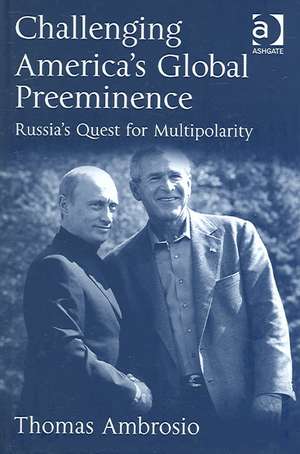Challenging America's Global Preeminence: Russia's Quest for Multipolarity
Autor Thomas Ambrosioen Limba Engleză Hardback – 28 mar 2005
Preț: 763.78 lei
Preț vechi: 1027.17 lei
-26% Nou
Puncte Express: 1146
Preț estimativ în valută:
146.17€ • 150.100$ • 121.65£
146.17€ • 150.100$ • 121.65£
Comandă specială
Livrare economică 04-18 martie
Doresc să fiu notificat când acest titlu va fi disponibil:
Se trimite...
Preluare comenzi: 021 569.72.76
Specificații
ISBN-13: 9780754642893
ISBN-10: 0754642895
Pagini: 208
Dimensiuni: 156 x 234 mm
Greutate: 0.43 kg
Ediția:1
Editura: Taylor & Francis
Colecția Routledge
Locul publicării:Oxford, United Kingdom
ISBN-10: 0754642895
Pagini: 208
Dimensiuni: 156 x 234 mm
Greutate: 0.43 kg
Ediția:1
Editura: Taylor & Francis
Colecția Routledge
Locul publicării:Oxford, United Kingdom
Cuprins
Contents: Russian foreign policy in the post-Cold War Era; Theoretical framework: to balance or bandwagon?; Russia reborn and contested; Rejecting the hegemonic coalition; Forming an anti-hegemonic coalition; Multipolarity through international institutions; Russian-American relations after September 11th; The Iraq crisis and the return to multipolarity; Russia, multipolarity, and the costs of bandwagoning; Bibliography; Index.
Recenzii
’...an authoritative study of Russian foreign policy, and above all American-Russian relations, since the disintegration of the USSR...well organized, carefully researched and well written, integrating area study and international relations theory in ways that are instructive for both approaches. The book is full of sound judgments and sophisticated analysis and is moreover sensitive to indeterminacy in international relations and foreign policy without abandonment to purely ad hoc analysis.' Allen Lynch, University of Virginia, USA ’Thomas Ambrosio succinctly analyses and surveys the multi-faceted difficulties Russia has encountered, and continues to face, in forging a coherent security policy since the disintegration of the USSR. He reveals the fundamental dilemma facing Russia since the disintegration of the USSR where Russian elites cannot imagine Russia as anything other than a great power while being a power in decline. The book’s great value is [its exploration of] the manner in which this dilemma running through Russian security policy attempts to grapple with America as the world’s hyperpower.’ Taras Kuzio, George Washington University, USA 'One strength of this richly documented book is its frequent use of policy-makers' quotes to make its point...this book is a valuable addition to the literature of International Relations - a very worthwhile read.' International Affairs
Notă biografică
Thomas Ambrosio is Assistant Professor at North Dakota State University, USA.
Descriere
Examining the shifts in Russian foreign policy and their potential impact on the status and influence of the United States in the international system, this outstanding volume examines why the Kremlin initially sought an alliance with the United States and the internal and external reasons why such a policy was unsustainable.
